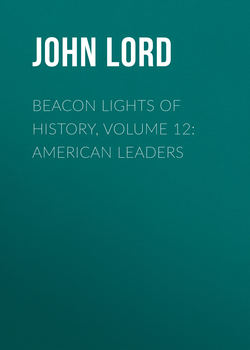Beacon Lights of History, Volume 12: American Leaders

Реклама. ООО «ЛитРес», ИНН: 7719571260.
Оглавление
John Lord. Beacon Lights of History, Volume 12: American Leaders
ANDREW JACKSON
AUTHORITIES
HENRY CLAY
AUTHORITIES
DANIEL WEBSTER
AUTHORITIES
JOHN C. CALHOUN
AUTHORITIES
ABRAHAM LINCOLN
AUTHORITIES
ROBERT EDWARD LEE
AUTHORITIES
Отрывок из книги
It is very seldom that a man arises from an obscure and humble position to an exalted pre-eminence, without peculiar fitness for the work on which his fame rests, and which probably no one else could have done so well. He may not be learned, or cultured; he may be even unlettered and rough; he may be stained by vulgar defects and vices which are fatal to all dignity of character; but there must be something about him which calls out the respect and admiration of those with whom he is surrounded, so as to give him a start, and open a way for success in the business or enterprise where his genius lies.
Such a man was Andrew Jackson. Whether as a youth, or as a man pursuing his career of village lawyer in the backwoods of a frontier settlement, he was about the last person of whom one would predict that he should arise to a great position and unbounded national popularity. His birth was plebeian and obscure. His father, of Scotch-Irish descent, lived in a miserable hamlet in North Carolina, near the South Carolina line, without owning a single acre of land,–one of the poorest of the poor whites. The boy Andrew, born shortly after his father's death in 1767, was reared in poverty and almost without education, learning at school only to "read, write, and cipher;" nor did he have any marked desire for knowledge, and never could spell correctly. At the age of thirteen he was driven from his native village by its devastation at the hands of the English soldiers, during the Revolutionary War. His mother, a worthy and most self-reliant woman, was an ardent patriot, and all her boys–Hugh, Robert, and Andrew–enlisted in the local home-guard. The elder two died, Hugh of exposure and Robert of prison small-pox, while Andrew, who had also been captured and sick of the disease, survived this early training in the scenes of war for further usefulness. The mother made her way on foot to Charleston, S.C., to nurse the sick patriots in the prison-ships, and there died of the prison fever, in 1781. The physical endurance and force of character of this mother constituted evidently the chief legacy that Andrew inherited, and it served him well through a long and arduous life.
.....
The first thing for Jackson to do after his inauguration was to select his cabinet. It was not a strong one. He wanted clerks, not advisers. He was all-sufficient to himself. He rarely held a cabinet meeting. In a very short time this cabinet was dissolved by a scandal. General Eaton, Secretary of War, had married the daughter of a tavern-keeper, who was remarkable for her wit and social brilliancy. The aristocratic wives of the cabinet ministers would not associate with her, and the President took the side of the neglected woman, in accordance with his chivalric nature. His error was in attempting to force his cabinet to accord to her a social position,–a matter which naturally belonged to women to settle. So bitter was the quarrel, and so persistent was the President in attempting to produce harmony in his cabinet on a mere social question that the ministers resigned rather than fight so obstinate and irascible a man as Jackson in a matter which was outside his proper sphere of action.
The new cabinet was both more able and more subservient. Edward Livingston of Louisiana, who wrote most of Jackson's documents when he commanded in New Orleans, was made Secretary of State, Louis McLane of Delaware, Secretary of the Treasury; Lewis Cass, governor for nineteen years of Michigan, Secretary of War; Levi Woodbury of New Hampshire, Secretary of the Navy; Roger B. Taney of Maryland, Attorney-General,–all distinguished for abilities. But even these able men were seldom summoned to a cabinet meeting. The confidential advisers of the President were Amos Kendall, afterwards Postmaster-General; Duff Green, a Democratic editor; Isaac Hill, a violent partisan, who edited a paper in Concord, New Hampshire, and was made second auditor of the treasury; and William B. Lewis, an old friend of the general in Tennessee,–all able men, but unscrupulous politicians, who enjoyed power rather than the display of it. These advisers became known in the party contests of the time as the president's "Kitchen Cabinet."
.....